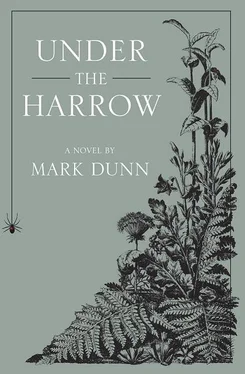Miss Wolf broke into a smile. “You are precisely right. And how have you come to this accurate conclusion?”
“A friend of mine from my workhouse youth surmised it in notes he made and which I gathered together after his death. I expected to find some truth in what he had taken from the mouths of some of our early forefathers — many of whom were still alive when he was a young man — but it isn’t until this very moment that I finally receive confirmation that the first of his several hypotheses is true.”
“And how specifically did it come to his ken?”
“From his kin , it turns out,” returned Antonia, grinning at her homophonic cleverness. “It was his own grandfather who told him. He was one of the original orphans, and as a child had quite audaciously asked of the conductor of the train that brought him to the edge of this valley wither it was that he was going, and the conductor whispered the destination to him when no one was looking. So you see, Miss Wolf: there are a few things about the Outland that some of us have known, which do not happen to come from The Encyclopædia Britannica. ”
“Ninth Edition,” added Mr. Graham helpfully.
“Ninth Edition. Thank you, Mr. Graham.”
Miss Wolf considered this fact for a moment and then asked what else Antonia’s friend had learnt from the elders.
“This and that. Surely you don’t expect me to speak so freely about everything I know, but I will say that I shall not hesitate to use what my dear late friend Mr. Traddles has written upon his dirty paper scraps as that gauge by which I shall keep you honest.”
Ruth Wolf seemed wounded. “Miss Bocker! I have no reason not to speak with you honestly and forthrightly.”
Antonia elevated an eyebrow. “We shall see.”
And with that, the obscurant mummified shroud, which had swaddled Dingley Dell for well over a century, began layer-by-layer to be peeled carefully away. Those salient facts that had been as unknown to the residents of our fair valley as all the mysteries of the night sky and every infinitesimal secret locked within the most miniscule molecule upon a microscopic slide now found illumination and explication and life and breath and free and unfettered airing within that simply-appointed sitting room, whose attendant lay in ignorant drug-induced slumber upon her bed up-stairs.
Never before had a Dinglian been privileged to hear the deepest secrets of his existence revealed and explained. Perhaps those who left this valley came to understand a few things prior to their demise or their ill-fated return, but never had a Dinglian been placed into such a glorious position of unqualified receptivity. We would take every advantage to learn all that we could and would try our best (and fail) to keep our tongues silent through the unveiling except when a point demanded further elucidation, or commentary was wholly called for. But first…
“The orphans,” Antonia reiterated.“Why were they brought here in the very beginning? For what purpose? My friend Mr. Traddles wasn’t able to learn it and none of us has ever known it.”
“Well, let me tell you first the original reason and then we’ll take up the second one, which was mandated by altered circumstances.”
I could not help myself: I leant forward, wearing, I have no doubt, the look of a young child who must know everything there is to know about a fantastical storybook kingdom. In a sense, Dingley Dell was itself just such a storybook place with a cloud of mystery overhanging it, as magical and mystical as any of the children’s stories to which Mr. Dickens had alluded. (Who was Cinderella? we had always wondered. Or Jack the Giant Killer or Sinbad the sailor? For they receive only the briefest mention in the novels of Dickens, and the tales ascribed to them aren’t provided upon the leaves of the otherwise most eclectically informative Ensyke. )
“Dingley Dell,” Miss Wolf began in the steady, starched voice of a professor standing stiff-armed behind his lectern, “which as you know was given that denomination by your ancestors in accordance with their wonted affinity for all things Dickensian (and in this specific case, Pickwickian ), began life as a rustic valley comprised of a small village or two and a smattering of farms and a goodly amount of acreage, which was uncut and unfurrowed and pristine in nearly every way. And there was abundant wildlife here in those days and a scenic prospect, no matter where one stood, of such primitive beauty as to soothe and nurture the most troubled human breast. No prettier spot on earth could be imagined, prettier it was than even that which our present-day eye beholds, for Dingley Dell was greener then and the sky above it bluer, it would seem, and more vibrant, and the sun much warmer in its radiance. A true Arcadia.
“But a rather odd sort of Arcadia, orographically speaking, for the valley that would come to be known as Dingley Dell lies within what is known as the Allegheny Front — the dividing line between the eastern edge of the Allegheny Plateau escarpment…”
“…and the lower Allegheny Mountains,” broke in Mr. Graham, excitedly.
“This strange conjunction of different land forms created something most unusual — a contained valley put down almost as if it were a basin or caldera, with high ridges running north and south, and lower thicklywooded ridges running east and west. Almost unique as valleys go.
“And it was in this unique, isolated Arcadian state that the valley presented itself to a handful of men from Philadelphia who came hither to camp and fish upon the banks of the river you call the Thames, but which is known elsewhere as the Double Pine. These were men of science, big thinkers, staunch supporters of Mr. Darwin’s theories, of which I suspect you know a little something.”
That being put in somewhat the form of a question, Mr. Graham nodded in the affirmative.
“And it came to pass that these men, with no small fortunes to their names, decided to buy up all of this valley for the purpose of conducting an experiment on a rather ambitious scale. They wished to learn if Mr. Darwin’s theories were correct and if a species of animal — in this case, the one that comes by the scientific designation ‘Homo sapiens’—would in an identical environment evolve in much the same way over time as did our primate ancestors. Would the fittest remove the less fit, the stronger supplant the weak, the brightest bring to extinction the dim-lights? But you see, the experiment did not — could never resign itself to answering those questions alone, for there were many other theories which these scientific men were hungry to test, other questions for which they sought answers: how, for example, does language and culture develop when there are no precedents upon which to build? How would societal institutions grow with no historical or generational models to emulate? In its purest, most unadulterated form, the experiment would require that its subjects be infants — infants brought to the valley in their most unformed state, and then left there to raise themselves, like Tarzan without his apes — no, no, you wouldn’t know Tarzan, would you? Edgar Rice Burroughs didn’t foist that vine-swinging gentleman upon the reading public until around 1912. But the unfortunate fact of the matter is that baby humans aren’t precocial — not at all like cheeping, self-reliant little chicks. They are quite the opposite, their altricial nature demanding that they be nursed and nurtured for a time, or else they should die in the crib and the experiment come to naught. It was for this reason that children above the age of three were procured, and that even then all children were afforded — over a period of several years — sufficient training in very rudimentary forms of survival, as well as education in the sort of trades that might readily be found in a rural society of the 1870s. Any advancement beyond those basic skills imparted by specifically selected vocational teachers would be effected by the children and their descendants alone, and that would be the thrust of one aspect of the study. The scientific men were most curious to see how these young innocents and their descendants evolved over the years, how they should build upon what they’d been initially taught, and I must say, to interject a personal note, that in fine, you’ve acquitted yourselves quite commendably.”
Читать дальше












